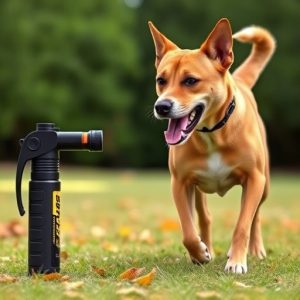Mace Formula Animal Pepper Spray: Safety, Decontamination, and Prevention
Mace formula animal pepper spray irritates eyes, nose, and respiratory system in pets. Immediate dec…….
Mace formula animal pepper spray irritates eyes, nose, and respiratory system in pets. Immediate decontamination after exposure is crucial: rinse with warm water, wash affected areas, and use a vinegar solution. Monitor pets for discomfort or severe symptoms; seek veterinary care if needed. Implement preventative measures like keeping pets indoors, securing homes, and training drills to minimize risks and ensure swift decontamination.
“Mace formula animal pepper spray, a powerful tool for self-defense against aggressive animals, has both benefits and potential drawbacks. This article delves into the intricate details of this controversial product, focusing on its ingredients, effects, and safety measures. We’ll guide you through understanding mace’s composition, what happens when pets are exposed, and crucial decontamination steps to ensure your pet’s well-being post-mace interaction. Additionally, we offer prevention strategies to safeguard your beloved animals from pepper spray incidents.”
- Understanding Mace Formula Animal Pepper Spray: Ingredients and Effects
- Steps to Decontaminate Your Pet After Mace Exposure
- Prevention Strategies: Safeguarding Your Pets from Pepper Spray Incidents
Understanding Mace Formula Animal Pepper Spray: Ingredients and Effects
Mace formula animal pepper spray is designed to deter and incapacitate aggressors, making it a popular choice for personal protection. Understanding its ingredients and effects is crucial when considering its use. The active ingredient in mace spray is capsaicin, derived from chili peppers. This substance irritates the eyes, nose, and respiratory system, leading to temporary blindness, coughing, and difficulty breathing. The formula also often includes other components like water, alcohol, and various stabilizers to enhance performance and longevity.
When a pet is exposed to mace spray, decontaminating them promptly is essential. This involves thoroughly rinsing the affected areas with warm water, especially around the eyes and mouth. If clothing is contaminated, they should be removed immediately and washed. It’s important to seek veterinary care if irritation persists or if the pet exhibits severe symptoms, as capsaicin can cause discomfort and potential health issues for animals, similar to its effects on humans.
Steps to Decontaminate Your Pet After Mace Exposure
After your pet has been exposed to mace formula animal pepper spray, decontaminating them promptly is crucial for their safety and well-being. The first step is to remove any visible traces of the spray from their fur or skin using warm water and a mild soap. Gently wash the affected areas, being careful around the eyes, nose, and mouth as these are sensitive areas. Rinse thoroughly to ensure no residue remains.
Once cleaned, use a damp cloth or towel to wipe down your pet’s entire body, removing any remaining spray. You can also use a solution of one part white vinegar and four parts water to help neutralize any remaining chemicals. After decontamination, keep an eye on your pet for any signs of discomfort, respiratory distress, or unusual behavior. If you notice anything concerning, seek immediate veterinary care. Regularly check their eyes and wash them gently if irritation persists. Ensure your pet stays hydrated and monitor their activity levels until any effects subside.
Prevention Strategies: Safeguarding Your Pets from Pepper Spray Incidents
To prevent your pets from being affected by pepper spray incidents, it’s crucial to implement a multi-layered strategy. Start by keeping your pets indoors during high-risk periods, especially when police or security forces are active in the area. Ensure all windows and doors are securely closed to prevent any accidental exposure. Regularly conduct drills with your pets, teaching them to remain calm and follow specific commands in case of an emergency.
In the event that decontaminating is necessary after Mace® exposure, act swiftly. Remove your pet’s clothing or any affected materials immediately. Rinse their eyes thoroughly with clean water for at least 15 minutes to flush out any irritants. For skin contact, gently wash the area with mild soap and water. If breathing difficulties arise, move your pet to a well-ventilated area and seek veterinary assistance promptly. Regular decontamination procedures after potential exposures can significantly aid in preventing long-term effects from Mace® formula animal pepper spray.
Mace formula animal pepper spray, while a powerful tool for self-defense against aggressive animals, requires careful handling. It’s crucial to understand its ingredients and effects, know how to decontaminate your pet after exposure, and implement preventive strategies. By following these steps, you can ensure the safety of your pets and minimize the impact of any accidental encounters with pepper spray. Remember, proper decontamination is key when your pet has been exposed, and proactive measures can significantly reduce the risk of such incidents occurring in the first place.


